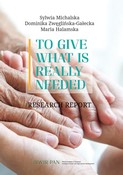Publikacje
Sylwia Michalska, Dominika Zwęglińska-Gałecka, Maria Halamska
 |
To Give What Is Really Needed
|
Pełna publikacja do pobrania w wesji PDF (3 MB)
Original edition: Dać to, czego naprawdę potrzeba. Raport z badań (2024)
The publication was supported by the EU Programme for Employment and Social Innovation (EaSI) (2014-2020)
The authors decided to study a very important but also difficult social problem – the negative consequences of ageing Polish society, focusing on long-term care in hospices. Elderly people more often need institutional help, because of singularization of senility and lack of family care. This group of rural inhabitants, ill, often with disabilities need special care. (...)
Elżbieta Psyk-Piotrowska
Dr hab., Professor emeritus, University of Łódź
Table of contents
Introduction: The Problem and the Proposed Solution 7
1. Social Innovations and Methods of Studying Them 13
1.1. Social Innovations: Between Theory and Practice 13
1.2. „To Give What Is Really Needed” Project: The Innovation Accordingto Various Research Approaches 15
1.3. The Innovation To Give What Is Really Needed as the Subject of Scientific Observation and Analysis 18
1.4. Research Methods and Techniques 21
1.5. Time of the Innovation’s Implementation: Pandemic, Refugee Crisis, State of Emergency, Russia’s Attack on Ukraine 26
2. Context for the Activity of the Institution Implementing the Innovation and the Control Institution 32
2.1. Demographic Context 32
2.2. Economic Context 35
2.3. Social Context 44
2.4. Health and Welfare Context 52
2.5. Summary 61
3. Setting Up an Interdisciplinary Team of Employees 62
3.1. Staff of the FHPE and NZOZ Nadzieja 62
3.1.1. Work Conditions at the Facilities 65
3.1.2. Job Descriptions at the Two Organisations 67
3.1.3. How the Work Affects the Physical and Mental Condition of Staff 71
3.2. Costs of In-Home Hospice Care (FHPE – NFZ): Estimate 81
3.2.1. Minimum costs of care determined on the basis of NFZ guidelines 81
3.2.2. Costs of Care, Taking into Account FHPE Wage Policy and Current Market Rates 87
3.2.3. FHPE Care and Social Welfare Homes 88
4. Building a Support Network of Local Institutions 91
4.1. Relationships Between the Institutions Before Innovation Implementation 91
4.2. Municipality Network Members’ Involvement During Innovation Implementation 97
4.3. The Support Network in the Opinion of Staff and Experts 110
4.4. Summary 113
5. Creating the Position of Dependent Care Coordinator (KOOZ) 114
5.1. Assumptions About the Role of the KOOZ Prior to Innovation Implementation 114
5.2. The KOOZ in the Innovation 117
5.2.1. Fulfilment of the KOOZ’s Duties 117
5.2.2. How the KOOZ Affected the Scope of Work of FHPE Staff 127
5.3. Instead of a Summary: Possibilities of Replicating the KOOZ Job Position 129
6. What Next for the Innovation? 131
6.1. Conclusions from the Study 131
6.2. Introducing the Tested Solutions into Policy-Making: End-of-Project Thoughts from the Participants, Experts and Researchers 134
Bibliography 142
Appendix 147
FHPE Staff Survey Tool 147
Questionnaire for the participants of the … municipality networking meeting 152
Needs Assess ment Questionnaire and Support Plan for Patients of the Prophet Elijah Hospice Foundation (FHPE) in Michałowo 154





